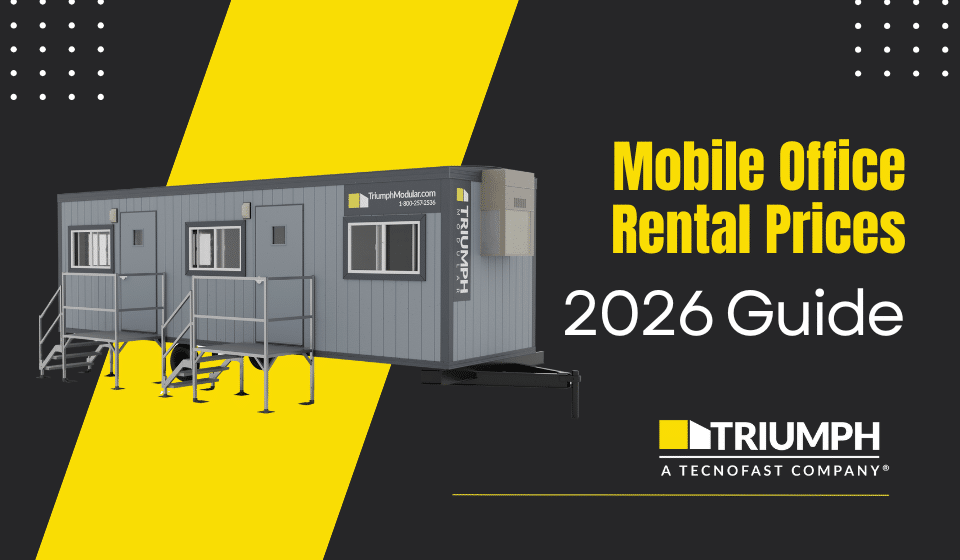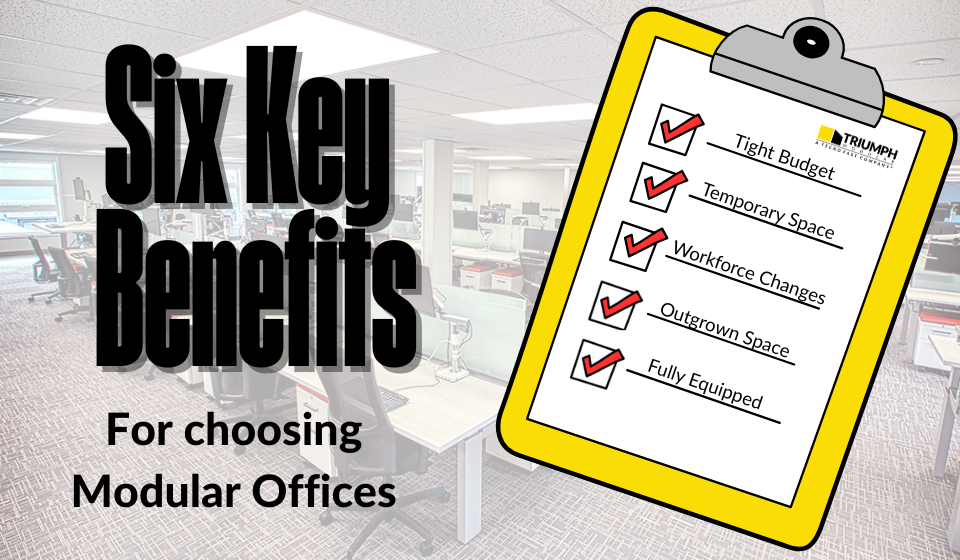The comparison between modular construction and traditional construction has been made several times over.
Traditional construction does have its place. However, there are a variety of advantages to choosing modular when it’s applicable.
For example, speed to occupancy, construction in a controlled environment, and even mitigating the negative effects of labor shortages.
At this point, you might be asking yourself: What modular option should I go with?
At Triumph, two of our primary modular offerings are mobile offices and modular buildings. Here are some comparisons between the two to help you decide which solution is right for your needs.
Differences Between Mobile Offices and Modular Buildings
| Mobile Offices | Modular Building | |
|---|---|---|
| What they are | Mobile offices come with a set design and are easily relocatable. Triumph offers two different types of mobile offices: – Mobile office trailers, which are actual trailers with wheels delivered to a location and come in a variety of sizes. These trailers are available in 8 foot, 10 foot, and 12-foot widths. – Portable office containers, which are shipping containers converted to office space. |
Modular buildings are structures that are assembled off-site before being delivered on-site for final assembly. They more closely resemble traditional construction buildings when compared to mobile offices. Both permanent and temporary modular building options are available from Triumph. |
| How they’re built | Mobile offices are fully constructed and ready for occupancy after delivery. | Modular buildings are constructed in a controlled factory setting where everything from waste to climate can be monitored. The buildings are mostly assembled before delivery, however, some additional work must be done on-site. |
| How they’re set up | Once mobile offices are finished being constructed, they’re ready for delivery. Minimal site work is needed since there’s no need for a foundation process. However, blocking, leveling, anchoring, and skirting are all part of the site setup process. | Modular buildings are split into temporary and permanent projects. A temporary project can be set up with the same block, level, anchor, and skirting processes of a single-wide office trailer. If the building is being permanently set or if the project requires a more permanent feel, such as walkways, landscaping, hardscaping, and lighting, then additional site-work and prep are needed. |
| Who they’re best for | Mobile offices tend to work best when speed to occupancy is of the utmost importance. Because there’s very little site work that needs to be done, they can be set up quickly. Mobile office interior and exterior configuration is set according to the model chosen, meaning that they work better for uses where design of space isn’t as big of a deal. No foundation work means that mobile offices work great for temporary applications, such as rapid testing labs or one-off events. |
Modular buildings serve several purposes since both permanent and temporary solutions are available. Modular buildings usually offer far more space and work in a multitude of industries and use cases, such as hospital additions, education centers, and more. |
| Customization | Mobile office space configurations are determined by the model you choose. What you see for options is what you’ll be getting with both mobile office trailers and portable office containers. There isn’t as much customization available for this reason. | Modular buildings have more leeway with interior and exterior design customization. While it’s true that most of the construction is done off-site, certain design elements can be added depending on the application to customize the building. However, it’s important to note that keeping mid-build design changes to a minimum helps keep a fast speed to occupancy. |
| Mobility | Mobile offices require no foundation and the trailers still have wheels. This makes relocation far easier than nearly any other build option. | Temporary modular buildings, such as double-wides, triple-wides, and quads can be delivered on wheels similar to mobile offices. At lease-end, the buildings can be knocked down and removed from the site with minimal disruption. The buildings would be transported back to Triumph in the same manner that they were originally delivered. Conversely, a more permanent modular building will be less versatile with how it can be moved. |
Both Mobile Offices and Modular Buildings Have Their Uses
Mobile offices and modular buildings differ greatly in their application. The main difference is that mobile offices tend to work better for shorter use and when less space is required, while modular buildings offer more space and work better for longer-term use, whether permanent or longer temporary.
The bottom line is that no matter what industry you’re in, Triumph has a mobile office or modular building solution to suit your needs.
Questions About Mobile Offices or Modular Buildings?
Our team is always here to answer any questions you have about mobile offices or modular buildings. Reach out to us. We’re here to help.




